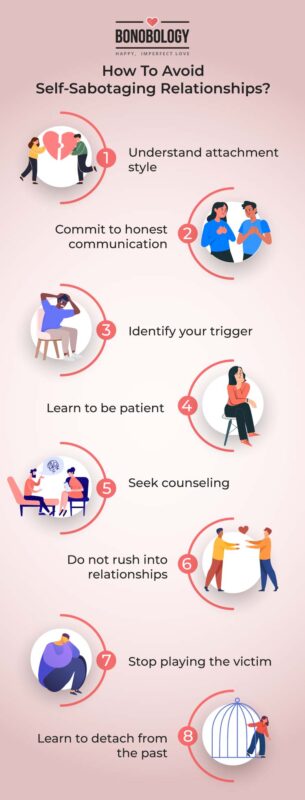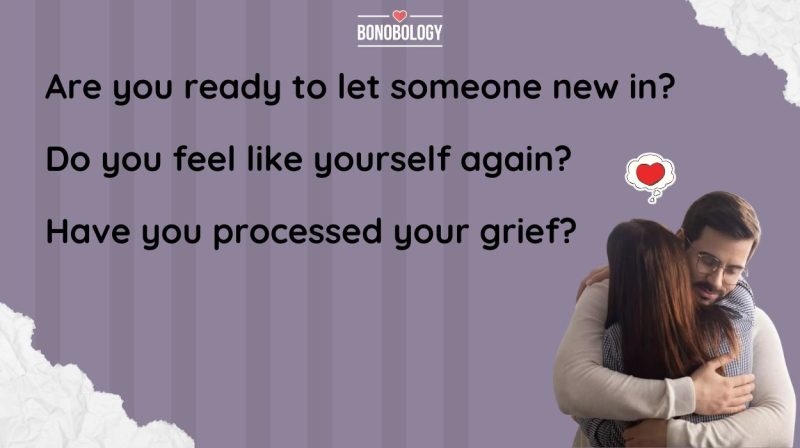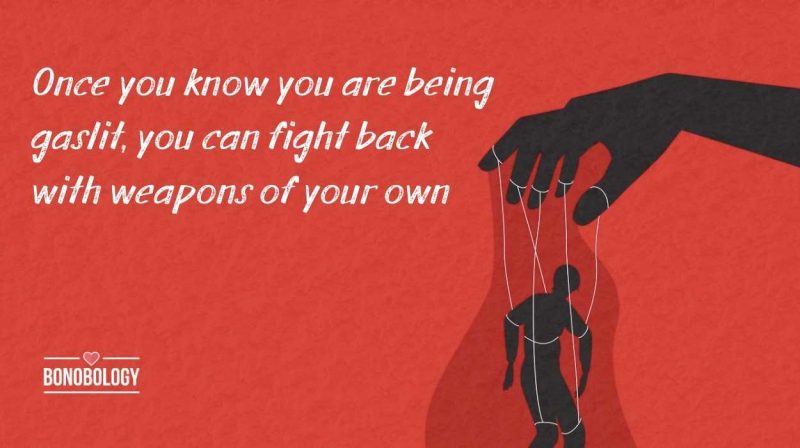Sometimes, we get in the way of building our own happily ever after. This tendency is what psychologists define as self-sabotage in relationships. This can be defined as a knack for making your relationship fall apart, either subconsciously or consciously. For a lot of people, self-sabotaging behavior is so inherent that they fail to recognize the problematic patterns.
There is no scope for correcting course and they subconsciously ruin the relationship. To stop self-sabotaging relationships, you need to learn to identify the signs and reasons for this behavior. Only then can you break the cycle, and give yourself a real shot at building meaningful romantic partnerships.
We speak to psychologist Jayant Sundaresan (Masters in Applied Psychology), who specializes in offering counseling for a range of relationship issues such as communication breakdown, expectation management, infidelity, separation and divorce, to understand more about why people indulge in sabotaging their relationships. He offers insights on the reasons for the behavior, what one should do once they gain awareness of their patterns, and how this awareness helps you grow.
Why Do We Self-Sabotage Romantic Relationships?
Table of Contents
Self-sabotaging often manifests as a tendency to subconsciously ruin relationships and the reasons for it can vary from person to person. Jayant says, “Sabotage doesn’t have to be as extreme as taking drugs, it could be as simple as chilling. Avoiding something and procrastination can be forms of self-sabotage too. The closer you get to the goal, the more you want to run away from it. This is because the next phase of life is upon you and you can’t handle that. It’s this avoidance of the next stage of a relationship or your life that leads to anxiety and self-sabotaging relationships.”
Counselor Meghna Prabhu, a psychotherapist and member of the APA, also explains why we self-sabotage romantic relationships, “Even though the triggers for self-sabotage may vary, it all comes down to one thing – not opening up emotionally and building an intimate relationship.”
Related Reading: How To Watch Out For The Relationship Red Flags – Expert Tells You
According to Meghna, this happens mostly because we are afraid that the relationship won’t work out. We may do things like finding reasons to break up, arguing about things we normally wouldn’t care about, and focusing on our individual lives more than the relationship.
The main reason for all of this is the fear that the relationship won’t last. So we don’t want to invest or open up and may even break up before the other person leaves us. It’s a way of being in control or believing that we are in control. Jayant adds to this, “Many such people think that I should be the dumper, not the dumpee. Again, it’s for control.” Some people even try to manipulate partners in order to get a certain outcome or reaction.
Besides, a partner with low self-esteem is always more likely to self-sabotage a relationship. The feeling that one is not good enough or doesn’t deserve to be loved becomes a trigger in such cases. Jayant says, “People with low self-esteem battle with the feeling of not being worth someone’s love. They think, “My partner will realize that I’m a fraud. They will think I am not deserving, that I’m not all that great”.”
The fears that lead to self-sabotaging romantic relationships can come from failed past relationships too. Some people also do these things because being vulnerable is scary, so they end up sabotaging a relationship. But being vulnerable and emotionally intimate with our partners is essential for making relationships work. As you can see, it all boils down to the fear of getting our heart broken. It’s a basic human tendency to avoid pain.
Related Reading: Emotional Baggage – What It Means And How To Get Rid Of It
Signs Of Self-Sabotaging Behavior
Jayant talks about how people sabotage their relationships. “You select a person who’s unsuitable for you or not as compatible with you because you don’t want to commit and settle down. Also, another way to self-sabotage is to repeatedly come back to grudges in a relationship. You have a laundry list of things that went wrong or are going wrong. You even point out things that can’t be fixed, like your partner’s height or things about him or his family that you knew from the beginning.
“Fear of having to transition from one stage of life to the next also makes people sabotage relationships. There’s also fear of aging, fear of responsibility – specifically emotional or financial responsibility – and fear of whether one will be a good parent or not. There could also be trust issues with one’s partner.

“If you’ve been cheated on previously, you’ll assume that this partner will cheat on you too. So, you continue to behave with that belief in the relationship. It becomes a self-fulfilling prophecy. And then there are some people who fear losing their identity. Some don’t wish to be answerable to anyone, they want to live their own life and not cater to anyone’s needs.”
This behavior is extremely common, and many people continue self-sabotaging romantic relationships without even realizing that the problem lies within. If you’ve had a string of failed relationships in the past, it helps to introspect whether it’s because of this latent tendency. Here are the signs of self-sabotaging behavior to take note of:
- Avoidance of negative emotions: Not dealing with anger, resentment, doubts, or frustration toward your partner or relationship is a big red flag
- Paranoia: Being paranoid that your partner is doing something wrong without any basis or proof. For instance, a person with self-sabotage tendencies may be convinced that their partner is cheating on them even when there is no evidence or red flags to suggest so
- Critical of partner: If you’re focusing on your partner’s shortcomings and imperfections all the time, and letting this perception eclipse all their good qualities and strong suits, then you may be sabotaging a relationship subconsciously
- Substance abuse: Relying on unhealthy habits such as excessive drinking, smoking, or drug use as a way of coping with your insecurities is also a clear-cut sign of self-sabotaging behavior
- Silent treatment: Using the violence of silence in fights primarily because honest communication doesn’t come naturally to you
- Holding grudges: If you can’t let go of the past frictions and continue to hold resentment against your partner long after the argument or conversation is over, it is a sure-fire way to self-destruct a relationship
- Avoidance of commitment: Another key indicator that you may be sabotaging a relationship out of fear is that you take the focus off your relationship and start prioritizing work, friendships, or hobbies the minute things start becoming intense
- Breaking promises: Deliberately backtracking on promises to invest in the relationship or plans to spend more time together. You’re not only ruining a relationship but also making your partner resent you for it. By doing so, you’re laying the groundwork for self-sabotaging relationships
Related Reading: What This Psychologist Did When She Said, “Husband Does Not Give Me Attention”
How To Avoid Self-Sabotaging Your Relationships?
We asked Jayant if a person is aware of their self-sabotage behavior in any way at all. He says, “No, they are not aware. Everyone can see their pattern clearly, but the person is oblivious. To see their destructive patterns is like holding a mirror. Who will be left to blame then? Themselves. Hence, the non-awareness. Talk therapy helps in bringing attention to your patterns, it helps in increasing this vital awareness.”
Speaking of how to avoid self-sabotaging your relationships, Meghna says, “The main thing is to understand what is causing it. You have to find the reason for the fear and address it. This can be done either by introspection or arriving at the root cause by talking to a therapist for individual or couple’s therapy.” Getting to the root of the issue is the only way you can stop self-sabotaging relationships. So, let’s try to decipher what you can do to avoid self-sabotaging your relationships.
1. Understand attachment style to stop self-sabotaging relationships
If you have been struggling to maintain long-term relationships, it helps to turn your attention to your attachment style. Often, the way we attach to others as adults is a reflection of our childhood or adolescent experiences. A person who has been through abandonment, trauma, loss, or toxicity in their nascent years may grow up to develop an insecure attachment style.
This can lead to emotions such as jealousy and anger, and if you don’t know how to deal with jealousy or your rage, it can lead you to self-sabotage romantic relationships. Similarly, growing up in an environment that was cold and isolated can make a person needy for reassurance and attention. This is a classic pattern of a partner with low self-esteem, someone who is designed to ruin their romantic partnerships by exhausting the other person with their constant needs.
While speaking about anxiety and self-sabotaging relationships, Jayant makes a point about childhood history and how what we experience as a child affects our understanding of relationships. “Personal history of childhood trauma restricts our world-view. We don’t have any understanding of the world beyond what we see as kids. You normalize the toxic relationships of your childhood and mimic them later in the adult situations of your life.
“If your family is abusive, or has neglected you as a child, you only realize that’s not healthy once you get good exposure to other children’s families. You then understand that there’s another way to live and love. So, the fundamental assumptions of our relationships stem from our childhood, the time when we have impressionable minds. When you are betrayed by an adult who you trusted immensely, these have ramifications later on.”
All of this can make a person go on sabotaging a relationship out of fear and trauma. However, attachment styles are not permanent. With the right help, you can work on yourself and do away with negative patterns to be able to build thriving romantic relationships.
2. Commit to honest communication
One of the biggest hurdles for a person inclined to sabotaging a relationship subconsciously is a fear of communication. Particularly, when it comes to talking about the not-so-pleasant aspects of the relationship. So, to break the cycle of self-sabotaging behavior, you need to overcome this communication problem.
The best way to do it is by initiating a conversation about your fears, apprehensions, doubts, and anxieties. In doing so, let your partner know all that’s been bothering you about the future of the relationship and create an environment where they can do the same. Discuss your problems and figure out the best way forward for you both. Don’t let the issues pile up for so long that the differences between you two become irreconcilable.
Jayant adds, “In order to stop sabotaging a relationship out of fear, another form of honest communication that you need to have is with yourself. You need to a) accept that you have a pattern of self-sabotage, and b) understand your patterns. Sit down and think of what your biggest fears are. Ask yourself if you purposefully enter relationships that have red flags that should send you running.
“Work on your relationship with yourself first. Reiterate your own goals and values, and ask yourself basic questions about your identity: Who am I? What are my goals? How do I see myself? And then think about what you need and what you want. These are two separate things. Gauge if they are in alignment.”
3. Identify your trigger to stop self-sabotaging relationships
To be able to stop self-sabotaging relationships, you need to understand what’s causing it. So, start by paying attention to your triggers. When you suddenly feel the need to snap the cord because you’re too afraid that things may not pan out as expected, introspect a little about what brought on that fear.
What situation were you in? How did it make you feel? Why does it scare you? If your fears come to pass, how would they affect you? It’s a good idea to start maintaining a record of these moments and your assessment of them. Over time, you’ll begin to see a pattern and that’ll help you connect with your vulnerabilities better.
Related Reading: What Is Stonewalling And How To Deal With It?
4. Learn to be patient if you subconsciously ruin relationships
Whenever a person sabotages a relationship, there is a clear pattern behind it – the relationship goes through a rough patch and they decide to withdraw emotionally to save themselves from getting hurt. The key here is to remember that no relationship is perfect, no relationship is easy. There are bound to be ups and downs.
It is the resolve to stay and fight for your togetherness that makes relationships last. So, you have to learn ways to be patient and stick by your partner when the going gets tough. It helps to build a support system to get you through these times of upheaval without worrying that your entire world will come crashing down.

5. Seek counseling to avoid self-sabotaging your relationships
Recognizing and accepting your unhealthy behaviors is never easy. Even if you do zero in on the problem, you may not know how to deal with it. This is why Bonobology offers individual and couples’ counseling as they can be reliable ways to avoid self-sabotaging your relationships. It gives you and your partner a safe and supportive environment to discuss your concerns in. Besides, a trained therapist can show you the way to break the cycle of self-sabotaging relationships in an empathetic and non-judgmental way.
Jayant says, “You may enter a therapy space by saying things like, “My last three relationships didn’t work out” or “The world screws me over”. A person might then ask the therapist: How do I stop self-sabotaging my new relationship? The therapist then assesses all their past situations and spots the common themes in a gradual process. They guide you to introspect on these patterns and help you take accountability gently.
“Initially, as you become aware of your patterns, you’ll get defensive. It takes courage to give up the mask and to be honest with yourself. We deceive ourselves very well, after all. As it sinks in, there’s a sense of loss and regret over the time that has been wasted, and the things that have passed you by.
“You feel anger. You may think, “I missed that once-in-a-lifetime relationship” or “I messed up my friendships” or “I won’t find someone like this again”. Since those people have moved on, this can lead to anger and grief.” A therapist can help you process these feelings. As long as you’re committed to working on yourself, you can bounce back from this damaging behavior and also save your new relationships.
Related Reading: 11 Examples Of Self-Sabotaging Behaviors That Ruin Relationships
6. Do not rush into relationships
A string of unsuccessful relationships can leave anyone feeling deflated, demoralized, and worn out. But don’t rush into a relationship in your desperation to make it work. For instance, don’t start dating the next hot guy you meet at a bar the day after you get out of a relationship, just to feel better about yourself.
Yet another relationship gone wrong will only add to your inherent fears of getting hurt or being left behind. This, in turn, will only aggravate your tendency to self-sabotaging romantic relationships. Once you realize that your own behavior is part of the problem, take some time to introspect on what kind of partner you want. Then, patiently wait for the right person to come along.
Related Reading: Responsibility In Relationships – Different Forms And How To Foster Them
7. Stop playing the victim
Given that people who display self-sabotaging behavior operate from a place of fear and often turn out to be a partner with low self-esteem, it is very easy for them to wallow in self-pity. You must stop playing the victim card to free yourself from this pattern of self-sabotaging romantic relationships.
The whole ‘poor me’ perception will only fuel your insecurities. This, in turn, will snowball into troublesome patterns such as being emotionally detached, playing the passive-aggressive game with a date, and making a love interest jump through the hoops to validate your sense of control. You have already seen where that leads.
So, focus on your strengths instead. Work on becoming a more confident and self-assured version of yourself. Someone who doesn’t need to feel in control of a relationship at all times. When you make these changes, you will see that you can get emotionally invested in a relationship far more easily.

8. Most importantly, learn to detach from the past
The tendency of sabotaging a relationship subconsciously is mostly related to unpleasant or traumatic past experiences. The fear and anxiety you feel could be stemming from an incident or series of events that impacted you deeply. These experiences, or at least how a person felt during those experiences, then become triggers for self-sabotaging behavior. You must learn to snap the cord and make peace with your past.
The next time you feel aggravated by a situation, pause and reflect on whether it’s a past experience that’s making you react disproportionately. It may not always work, but being mindful of this possibility helps you move toward healthier behavior patterns. The pattern of self-sabotaging relationships can be a crippling experience but not one that you are doomed to live with. Once you learn to identify and acknowledge the problem, there are a myriad of ways to address and overcome it. If you’re struggling to make headway on your own, know that seeking expert help is an act of self-care.
For people who are wondering, “Will this finally help me stop self-sabotaging my new relationship?”, Jayant wants you to know this: “When you’re aware of your patterns, your choices will change, and your expectations from yourself and from the people around you fall into place. You will connect the dots from the past and turn a new chapter. There is hope.”
FAQs
The first thing you need to do is look at your past experiences. It could be a toxic childhood or a string of broken relationships that is causing self-sabotaging issues. To stop self-sabotaging your relationships, identify the trigger, be honest and communicative, seek counseling, and be patient.
Work on getting rid of the anxiety, commitment phobia, and insecurity that leads you to push pull relationships. Stop playing the victim card and detach yourself from the past. Don’t rush into relationships, instead take your time and know what you want from a partner.
You know you are self-sabotaging a relationship when you make it only about yourself, you are very critical of your partner, and you become anxious and insecure when things between you two get serious. You have trust issues, you overthink, and you cannot let go of your past.
5 Ways Being Honest With Yourself Will Help You Understand Your Relationship Better
Your contribution does not constitute a charitable donation. It will allow Bonobology to continue bringing you new and up-to-date information in our pursuit of helping anyone in the world to learn how to do anything.





















